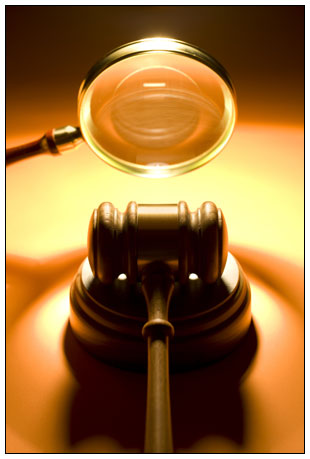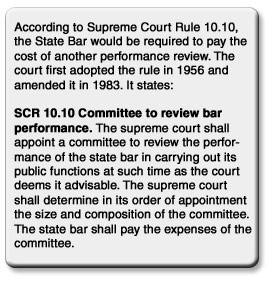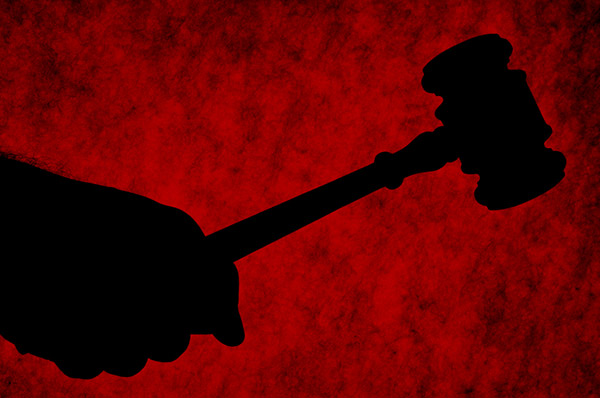Justices, attorneys divided on need for State Bar review (UPDATE)
By: Jack Zemlicka, [email protected]//November 9, 2011//
Justices, attorneys divided on need for State Bar review (UPDATE)
By: Jack Zemlicka, [email protected]//November 9, 2011//
 For the first time in 30 years, the Wisconsin Supreme Court is considering the formation of a committee to evaluate the performance and function of the mandatory State Bar.
For the first time in 30 years, the Wisconsin Supreme Court is considering the formation of a committee to evaluate the performance and function of the mandatory State Bar.
The court voted 4-3 on Monday to deny a petition seeking abolition of the mandatory bar, but agreed to next month discuss the possibility of invoking its authority to review the performance of the state organization.
According to Supreme Court Commissioner Julie Rich, the court last reviewed the bar’s performance in 1981, at the expense of the State Bar. Rich or State Bar officials didn’t immediately know how much the bar spent on the 1981 review.
After the prior review, the committee recommended the bar remain a mandatory organization to best preserve member benefits; a recommendation the court adopted.
According to Supreme Court Rule 10.10, the State Bar would be required to pay the cost of another performance review.
State Bar President Jim Brennan said he is confident that another audit would result in the organization maintaining its current structure.
“I think the bar is in a robust way fulfilling the reasons for which it was organized,” he said. “That said, I hate to spend a whole lot of money satisfying the court that is the case, but it is truly their call.”
Gonzalez Saggio & Harlan LLP attorney Nate Cade, a supporter of the mandatory bar, said that expense is unnecessary.
 “Those supporting a voluntary bar lost and now this is going to cost the bar more money,” Cade said. “I promise you, the court is not going to pay for the study.”
“Those supporting a voluntary bar lost and now this is going to cost the bar more money,” Cade said. “I promise you, the court is not going to pay for the study.”
Madison attorney Jim Thiel, a co-author of the dismissed petition, said there is value in a review, however, given that is has been 30 years since the previous one. Audits are a way, he said, to make sure organizations are fulfilling their obligations to members and the public.
Thiel said his expectation of a review committee would be to decide what type of organization the State Bar is supposed to be.
“Is it a trade organization that promotes itself to members?” he asked. “Or some other type whose function is to improve the quality of legal service to the public?”
If the bar is revealed to be nothing more than a trade organization, Thiel said, there is no justification to charge attorneys mandatory dues of $224, which are in addition to $243 in annual Supreme Court assessments.
“If it is a trade organization, the bar should be voluntary,” he said. “If it is not, what does it do to improve the quality of legal services?”
Thiel said he questions how much of dues payments directly go toward improving legal services for the public, given that court assessments cover the costs of regulating the profession through the Office of Lawyer Regulation and cover contributions to legal service providers for the poor.
Cade argued that the bar uses member dues to pay for services such as the Wisconsin Lawyer’s Assistance Program and an ethics hotline that help lawyers do their jobs.
He acknowledged that not every service offered by the bar is relevant to every member, but said that isn’t reason enough to abandon the current structure of the organization.
Cade declined to speculate on how a committee would grade the bar on member benefits, but said he is unconvinced that it would score so poorly that a voluntary bar would be the best option.
“I have not heard anyone argue that another state with a voluntary bar is doing things better,” Cade said. “So it’s very difficult to establish criteria for a study and judge the bar on those criteria. What’s the comparison?”
Supreme Court Justice David Prosser said he is not in favor of a review. He voted Monday to dismiss the petition abolishing the mandatory bar prior to holding a public hearing.
Prosser said he is unconvinced a review of the bar would uncover any new arguments that will convince a majority of the court to make the organization voluntary.
“Certainly, it’s fair to ask what are the bar’s objectives and are they being met,” he said. “But to just say, ‘Let’s make it a voluntary organization,’ I think we have to know exactly what the consequences would be.”
Justice Patience Roggensack said she will hold off on endorsing the formation of a review committee until it’s clear exactly what the committee would evaluate.
“We want to be sure what we’re asking the bar to do is a worthwhile project,” she said. “Especially since we’d be saying, ‘You pay the bill.’”
Read more on the State Bar
- WILL: State Bar of Wisconsin to end DEI practices; State Bar: No changes other than diversity definition
- State Bar of Wisconsin Board candidates silent on issues
- State Bar of Wisconsin sued over diversity program in new federal lawsuit (UPDATE)
- Wis. Attorney General Kaul: State Bar has good process in place when lawyers face criminal charges
- Citing Wisconsin case, SCOTUS declines challenge against Mich. State Bar
- Hickey to serve as State Bar president-elect
- Briggs committed to increasing diversity of Wisconsin’s legal profession
- State Bar launches Pro Bono Opportunity Portal
- Supreme Court holds public hearings for client protection fund fee increase, judicial code updates
- 2020 law school graduates, students cope with unprecedented pandemic fallout
Legal News
- Milwaukee drops security personnel ordinance
- Wisconsin Supreme Court tacks on additional months to already suspended lawyer
- Supreme Court: Abortion protester’s First Amendment rights violated
- These doctors were censured. Wisconsin’s prisons hired them anyway
- Ruling reinstates lawsuit over ‘Black Lives Matter’ school posters
- Wisconsin Supreme Court to consider whether 175-year-old law bans abortion
- Wisconsin man facing bestiality and felony bail jumping charges
- Waukesha County woman indicted in National Health Care Fraud Law Enforcement Action
- Man sentenced to 15 months for fraud involving luxury vehicles
- Wisconsin Department of Justice Fire Marshal investigating fire that killed six
- Ozaukee County first responders save family of three, father and son on Milwaukee River
- Supreme Court sends Trump immunity case back to lower court, dimming chance of trial before election
Case Digests
- Termination of Parental Rights
- First Amendment Rights
- Termination of Parental Rights
- Late Filing
- Real Estate-Attorney Fees
- Ineffective Assistance of Counsel
- Variance-Interpretation of Zoning Ordinances
- Sentencing
- Fourteenth Amendment’s Due Process Clause-Jury Instructions
- Unlawful Collection Practices-Evidence
- Sentencing-Vindictiveness
- Prisoner Grievances-Exhaustion of Administrative Remedies











